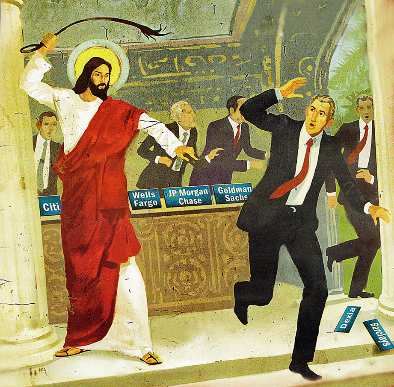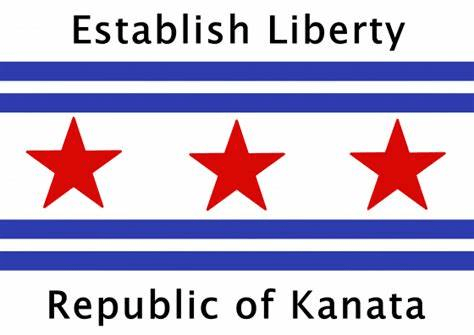The Temple Toppling Times
Volume 1, No. 1: September 2023
Jesus had it coming to him: An Epistle to Pharisees in Training
by guest columnist Rev. Kevin Annett, M.A., M.Div.
(Alumnus, Vancouver School of Theology, 1990)
“We know all about it, Kevin. The only problem is you wrote a letter about it.”
– United Church official Brian Thorpe to the author after his firing without cause for exposing child murder in the church’s Alberni Indian Residential School, March 3,1995
“Christianity sounds like a wonderful idea. Somebody should try it sometime.” – George Bernard Shaw
If I were you, I wouldn’t read this. After all, you’ve been warned about me. Because unwanted truths are like pesky mustard seeds: they can take root anywhere, even in the hallowed (hollowed?) halls of Christian seminaries. Fortunately, I’m not you, though not for want of trying.
Yes indeed. I once sought fervently to be a terminally nice Christian, before I was nicely terminated. But germs of subversion lingered with intent on my first day as a fresh fish waiting to be fried at the Vancouver School of Theology (VST). And that was even before I saw Professor Jim “Lard Ass” McCullum shove his huge girth to the front of the smorgasbord line at the weekly VST hog fest.
For one thing, I wondered why everyone at VST smiled all the time. It felt like I was an orderly again among the overly sedated inmates on Ward Two West of the UBC Psychiatric Hospital. After my first day as an official pious bunny, my jaws ached, for woe betide any of us who didn’t grin back compulsively at complete strangers. When in Rome, after all.
The official greeting to us gaggle of bright-eyed Tartuffes was delivered by an odious creep who had Sleaze Merchant written all over him: VST Principal Bud Phillips. Bud was a former public relations whiz kid who had found his true calling instructing prospective clergy on how to serve both God and Mammon.
Buddy Boy immediately let rip with a homily that, while not exactly scriptural, hit all the right points required by career conscious clerics, beginning with something he called “paying the rent”.
“You can’t do anything in ministry without paying the rent first, like in any family,” the guy said with a flashy, Fortune 500 smile.
A few years later, I would have lobbed back at him a wry quip about the futility of paying rent on a condemned building. But I was still stupid back then. I even put money in the collection plate on Sunday mornings.
Nobody ever explained to me or my fellow seminarians who we were to pay the rent to. I had to find that out for myself the hard way, starting from Bud himself. For that same year, he sacked two VST staff members, both single moms, to free up the funds to pay for the renovation of his private residence. Being Canadians, nobody at VST objected, except me, of course. But that’s another story.
The other term El Padrone spouted incessantly at us like it meant something was “the church family”, or simply “the Family.” His constant repetition of it like a monastic mantra evoked in me images of Don Vito Corleone and his clan from The Godfather, and of their goombahs making late-night drives to the local body dumping grounds. I didn’t realize at the time how accurate the comparison was.
Be that as it may, and it usually is, I knew after only a week in Lotus Land that I was not only being conned but deliberately groomed into automated compliance with something unseen and grim. As Lard Ass McCullum instructed us in our Church Ministry class when he wasn’t stuffing his face with pastry,
“Everyone has their own personal notions of God and ministry. But those become secondary and unimportant once you become a paid accountable minister in the Church.”
It wasn’t just our own “notions” of God that we were to trash. Also to be nicely terminated were our ideas of ethics and justice, as well as the law: especially when it came to covering up all those church crimes and little cadavers that nobody ever wants to talk about.
It all made sense from a Pharisaic point of view, I suppose, for the same reason that it remains the policy in the Catholic Church and every other denomination for child rapists and killers to be protected and victims silenced whenever the filth surfaces. Clearly, God, like Don Vito Corleone, cannot tolerate a snitch.
Sixty thousand dead Indian residential school children can’t be wrong.
“But what does all that have to do with innocent, evangelical me?” I can hear you budding pastors quibble. Give it time. You’ll find out.
In the meantime, in the way of a pause and speaking of Jesus, let me bow out for a moment to offer this apt theological insight from my good friend, the novelist Kurt Vonnegut.
For all you non-literati, Kurt had the enlightening experience at a tender age of occupying a ringside seat at the incineration of 40,000 fellow human beings by Allied bombers at Dresden, Germany in February 1945. The incident helped him sell a lot of books and get rich and famous. In his words,
“An unexpected visitor arrived one day from outer space and made a serious study of Christianity. He wanted to learn, if he could, why Christians found it so easy to be cruel. He concluded that at least part of the trouble was slipshod storytelling in the New Testament.
“The alien supposed that the intent of the Gospels was to teach people, among other things, to be merciful, even to the lowest of the low. But the Gospels actually taught this: Before you kill somebody, make absolutely sure he isn’t well connected.
“The flaw in the Christ stories, said the alien, was that Christ, who didn’t look like much, was actually the Son of the Most Powerful Being in the Universe. Readers understood that, so when they came to the crucifixion, they naturally thought, “Oh, boy! They sure picked the wrong guy to lynch that time!” And that thought had a brother: “There are right people to lynch.” Who? People not well connected.
“The visitor from outer space made a gift to the Earth of a new Gospel. In it, Jesus really was a nobody and a pain in the neck to people with better connections than he had. So the people amused themselves by nailing him to a cross. There couldn’t be any repercussions, they thought, since the new Gospel hammered home what a nobody Jesus was.
“And then, just before the nobody died, the heavens opened up, and there was thunder and lightning. The voice of God came crashing down. He told the people that he was adopting the bum as his son, giving him the full powers and privileges of The Son of the Creator of the Universe throughout all eternity. God said this: “From this moment on, I will punish horribly anybody who torments a bum who has no connections!"
Ah, if only it were true, eh? But then you’d all be out of a job as future, gainfully employed God Experts.
Luckily for all of you, God remains on the side of the biggest battalions, to quote Napoleon. And that's one of the reasons why you never hear about me anymore or all those sliced and diced aboriginal children. It’s also why Jesus, that itinerant nobody, clearly had it coming to him, like I did, for causing such an unpleasant disturbance in the Temple that one time.
Now go whitewash a tomb.
Kevin Annett is a graduate of the Vancouver School of Theology (May 1990) and a former ordained clergyman in the United Church of Canada. He was fired without cause in January 1995 and publicly “defrocked” without due process and blacklisted after he exposed the murder of Indian residential school children and the theft of native land by the United Church and its business partners, the B.C. government and Weyerhaeuser Ltd.
Since the spring of 1995, Kevin has led the campaign in Canada and globally to expose and prosecute genocide and crimes against children by governments, churches, and corporations. After his work helped force Canada’s Indian residential school “apology” in June 2008 and the resignation of Pope Benedict from his office in February 2013, Kevin was twice nominated for the Nobel Peace Prize and the Order of Canada.
Kevin is an adopted member of the Ojibway indigenous nation and was given by them the name Eagle Strong Voice. He is the author of twenty-five books and the award-winning documentary film Unrepentant (2007).
Here We Stand
Here We Stand is the official voice of The Republic of Kanata and the Republican Party of Kanata. The weekly program is a platform to unite and mobilize the revolutionary remnant who are forming the basis of a new society based on equality, Common Law and liberty.
The Vision and Program of the Republic and the Party can be found here: Establishing Liberty: The Case for the Republic of Kanata - https://www.amazon.com/dp/1721282033
The Republic and the Party can be contacted at republicofkanata@gmail.com. Kevin's email is thecommonland@gmail.com.
See also http://murderbydecree.com/
See also https://republicofkanata.org/
Donations to Here We Stand can be made by writing to the emails above.
Kevin's recent books, available through Amazon, are listed below:
Murder by Decree - The Crime of Genocide in Canada: https://www.amazon.com/dp/1530145619
Unrelenting: Between Sodom and Zion: https://www.amazon.com/dp/1523905778
Establishing the Reign of Natural Liberty: A Common Law Training Manual: https://www.amazon.com/dp/1544239610
At the Mouth of a Cannon: Conquest and Cupidity on Canada's West Coast: https://www.amazon.com/dp/1983790842 , https://www.amazon.com/dp/B07JZKNDJK
Truth Teller's Shield: A Manual for Whistle Blowers & Hell Raisers: https://www.amazon.com/dp/1537363948
Establishing Liberty: The Case for the Republic of Kanata: https://www.amazon.com/dp/1721282033
Here We Stand: The Call of the New Protestant Reformation: https://www.amazon.com/dp/1974273474
Fallen - The Story of the Vancouver Four: https://www.amazon.com/dp/1548152684
The Sacrifice - Of Family and Empire: https://www.amazon.com/dp/1727005961
1497 and so on: A History of White People in Canada or, The Caucasian Healing Fund:
https://www.amazon.com/dp/1541034961
The Border: A Post-Canadian Anthology - https://www.amazon.com/dp/1092763910
Kevin's award winning documentary film Unrepentant can be viewed at https://www.youtube.com/watch?v=swGEK8duSiU . See also an insightful personal interview "Who is Kevin Annett?" (2013) at: https://www.youtube.com/watch?v=AY4h3hDjOYM
--
Listen to Kevin live every Sunday at 6 pm eastern at https://bbsradio.com/herewestand . See the evidence of genocide in Canada and globally at http://murderbydecree.com/











